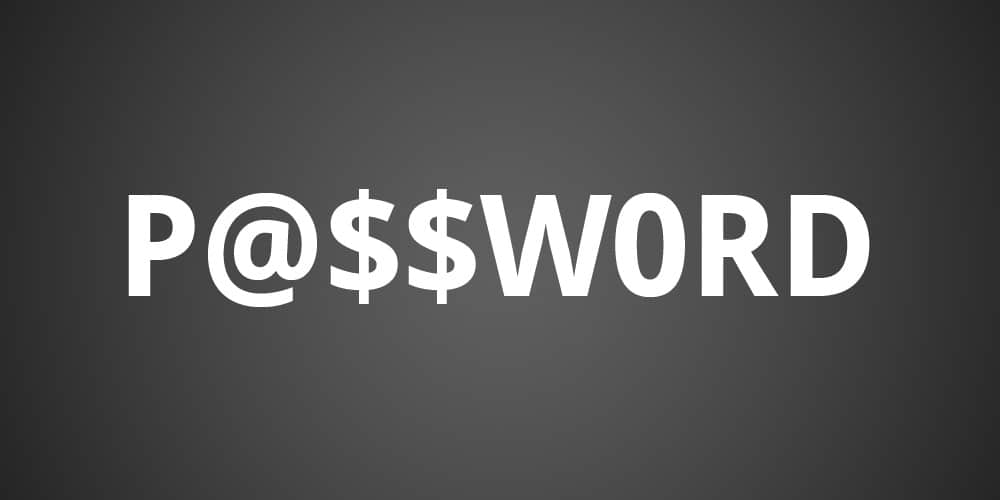
- #GOOD PASSWORDS TO USE UPDATE#
- #GOOD PASSWORDS TO USE PASSWORD#
- #GOOD PASSWORDS TO USE CRACK#
Word strings: Pick a sequence of words based on visual, not semantic, cues. #GOOD PASSWORDS TO USE PASSWORD#
Instead of creating your password from a common word or phrase, use a passphrase that employs a combination of unrelated words or characters: The blessing and curse of these tips is, while they help you avoid easily discovered passwords, you're left with a pressing question: How are you supposed to create a strong password you can also remember? 2.
Don't use personal information: Your favorite movie? Sports team? Birthday? This information is publicly available in multiple places online, starting with your social media accounts, so don't use it in your passwords. Avoid obvious character substitutes: Using "$" for "s" may feel pretty slick, but hackers also know this and incorporate common substitutions into their algorithms to discover password variations such as. Hackers know this and account for it in brute force or dictionary attacks. #GOOD PASSWORDS TO USE UPDATE#
Don't add numbers to passwords: When asked to update a password, many users add the next number in sequence - 2 or two and so on - to the end of it. Never reuse passwords: If you reuse passwords, hackers will have access to multiple accounts when they figure out one password. 
Eight characters is the minimum length to use, and 15 or more is better. Longer is better: A brute force attack requires progressively more time the longer your password is.The first step in creating strong passwords is to avoid obvious choices by using these password tips: Follow the password suggestions below to create and maintain the best passwords possible. 6 tips for creating a strong passwordĬreating passwords is not difficult, but it does require some careful thought to protect your business's data. These multiple attack methods highlight the importance of strong passwords and identity management strategies. Phishing: Fraudulent messages are sent via email, text, phone, or social media channels asking for login credentials.

Existing data breaches: Information is acquired from previous hacks sold online, which highlights the danger of reused passwords.Public information: Personal information - such as birthdays, favorite sports teams, or a pet's name - are found online and often used in passwords.Dictionaries: Another automated program uses a dictionary to combine words and abbreviations in common ways such as aceofspades or iloveu.Brute force: An automated program generates password combinations using every possible character string until it produces your password.
#GOOD PASSWORDS TO USE CRACK#
Hackers use multiple tactics to crack passwords: Strong password management policies are essential to protect your company's data. Poor password management policies undermine the strongest passwords.
Security breaches have increased 67% since 2014 and 11% since 2018.Įven worse, 43% of data breaches occurred at small businesses with an average cost of $150 per stolen record. A data breach's average cost was $3.92 million in 2019. Data breaches compromised 4.1 billion records in the first half of 2019. The stakes are too high for businesses to use weak passwords: These include using easily guessed passwords such as qwerty or 12345678, reusing passwords, or adding a number to the end of an old password to update it. Instead, because nobody is prepared when a request for yet another new password appears, we rely on the same bad password ideas. The harder part is getting people to do both these things. Overview: What makes a strong password?Ī strong password has two characteristics: It's easy to remember but hard to guess. We'll go over the features of effective passwords and the best practices to create them so you can better protect your small business. Strong passwords are your first and best step toward endpoint security. Every digital device (aka "endpoint”) connected to your computer network is a potential entry point for bad actors to access confidential information. The stakes are even higher at your small business. If any of those are compromised, the end is nigh. I have more than 50 password-protected devices and applications - everything from my iPhone and Chromebook laptop to my mortgage, checking, email, and credit card accounts. The same thing is not true when it comes to my passwords. While I don't normally volunteer this information, if other people know it - or somehow figure it out - the flow of happiness in my life will remain uninterrupted. I consider myself a red-blooded native Texan, but I'm also a not-so-proud yet enthusiastic devotee of "Married at First Sight: Australia," and, for reasons I still don't quite understand, cried like a baby after watching Richard Linklater's "Boyhood." We all have secrets no one needs to know. The Ascent shares six strategies to create strong passwords to protect your data. Password security is more important than ever as business computer networks expand and connect more devices.






 0 kommentar(er)
0 kommentar(er)
